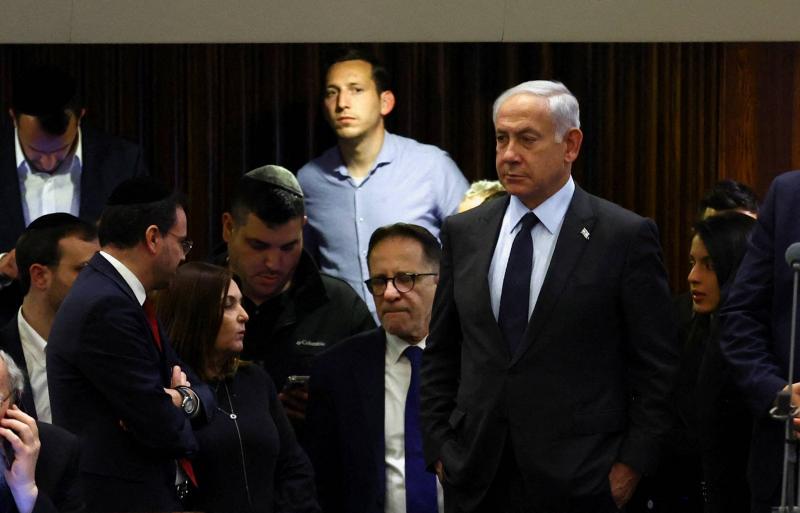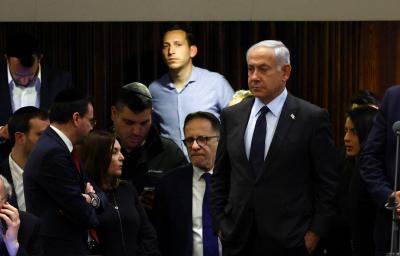Israeli Prime Minister Benjamin Netanyahu has postponed consideration of judicial reforms that sparked unrest in Israel, yet he remains trapped between his far-right allies, whose support he needs to stay in power, and a strong wave of opposition to their plans. Netanyahu has succumbed to protests, strikes, and appeals from political leaders and foreign allies to delay the key political agenda of his nationalist-religious coalition, which aims to enhance government power over the judiciary.
However, there is no indication that either side is willing to back down when parliament reconvenes next month, nor is it clear whether the 73-year-old Likud party leader can reach a compromise that keeps him in power without exacerbating divisions within Israeli society. Anchel Fefer, an unofficial biographer of the Israeli Prime Minister, stated, “Netanyahu is trapped… He is facing a level of opposition and protests he never imagined.”
This illustrates the dilemma facing Israel's longest-serving Prime Minister, who managed to return to power last year despite an ongoing corruption scandal and what appeared to be an end to his political career following the collapse of his previous coalition in 2020. In announcing the postponement of the judicial reform discussions on television, Netanyahu cited the wisdom of the prophet Solomon, suggesting the need to extend a hand for dialogue. He said, “I do not wish to divide the nation into two… We are not facing enemies but our brothers.”
Despite his attempts to implement a policy that polls show is widely rejected by the public, Netanyahu mocked his opponents as an extreme minority working to “incite a civil war.” Such rhetoric highlights the significant risks facing the Prime Minister regarding his hopes to extend his rule after 15 years in office through six coalitions since the 1990s. It also underscores the challenges Israel faces amid a new security crisis in the West Bank and a coalition that has raised concerns among longtime allies following its rise to power in the fifth general election in less than four years.
Polls indicate that his coalition would lose any new elections, and Netanyahu can simultaneously count on little goodwill from old enemies and former allies who still harbor grievances from past confrontations. Opposition leader Yair Lapid, a former partner in Netanyahu's coalition, commented on the delay in judicial reforms, saying, “We have a bad experience from the past, so we will first make sure there are no tricks or deceptions here.”
**Limited Options**
Netanyahu, a former member of an elite special forces unit, had his older brother, Yonni, killed while leading a rescue operation of hijacked airplane passengers in Entebbe in 1976. He has shown little interest in the decades-old vision of establishing a Palestinian state alongside Israel. U.S.-led Israeli-Palestinian negotiations stalled in 2014 under his leadership, and there are currently no prospects for resuming them.
Netanyahu is regarded as security-hawk, relying on appealing to the instinctive fears of his electoral base in towns and settlements far from the glamorous modernity of Tel Aviv. Yet, his options are limited. Fefer stated that he must choose between trying to buy more time for his stubborn coalition partners to retreat, defeating the opposition with a parliamentary majority, or convincing some of its cautious leaders to replace his partners in a new government.
Complicating matters further, Netanyahu himself faces corruption charges, accused of illegally receiving gifts and providing regulatory favors in exchange for favorable media coverage. Netanyahu describes these charges as politically motivated, denying any wrongdoing and asserting that his judicial reforms are unrelated to those charges.
Unlike his previous coalitions, Netanyahu is no longer able to unite left and right factions. The man who has been a thorn in the side of liberal opinion for over two decades now finds himself on the left wing of his own government. Among his coalition partners are far-right supporters of Jewish settlers, who have disturbed Israel's foreign allies with unacceptable comments about Palestinians.
In a bid to win their favor, Netanyahu granted them senior ministerial positions responsible for finance and security, and promised to establish a national guard unit that critics fear could turn into a right-wing militia. However, with the path forward becoming increasingly difficult, he may now have little left to promise them.




